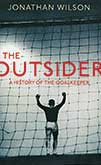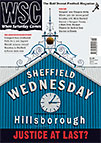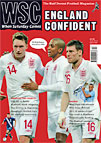 A History of the Goalkeeper
A History of the Goalkeeper
by Jonathan Wilson
Orion Books, £20
Reviewed by Jonathan O’Brien
From WSC 314 April 2013
Of all the “name” football writers on the merry-go-round today, Jonathan Wilson is arguably the best value, even if a few of his many theories and pet obsessions tend towards the overly self-indulgent. He’s a busy man, too – running the quarterly Blizzard while producing columns for the Guardian and Sports Illustrated and roughly one book per year. The Outsider is his sixth tome since 2006, the kind of workrate that sees a lot of writers spread themselves too thinly. But Wilson’s prodigious energy doesn’t seem to dilute the quality of what he comes up with and this meticulous study of the goalkeeping art is characterised by the attention to detail that he brings to everything he writes.
Starting with a study of football in the 1800s, he demonstrates how the mere fact of being a goalkeeper has always carried with it the smell of the scapegoat. In Victorian times the position was occupied by small boys, “duffers” and “funk-sticks” (milksops who had failed to perform elsewhere on the pitch). As the years went on and the sport evolved at snail’s pace, deaths were commonplace for keepers – Celtic’s John Thomson, accidentally kicked in the head during a match in 1931, being an infamous example.
Wilson has put in plenty of air miles, heading for locales as far-flung as Brazil and Russia. The latter country, which once produced great keepers by the lorryload, has nursed a special obsession with the position since before the 1917 revolution (an assertion backed up with quotes from none other than novelist Vladimir Nabokov). Brazil, contrariwise, has had mostly white keepers due to some strange socio-racial issues – the odd exception such as Dida not withstanding. Although, as Wilson shows, English football has nurtured a similar instinctive distrust of black keepers.
African keepers, specifically, sit even lower down the food chain of perception. Two of the best, Cameroon’s Thomas N’Kono and Joseph-Antoine Bell, enjoyed a (mostly) friendly 20-year rivalry after learning from Yugoslavian legend Vladimir Beara. N’Kono was the natural, Bell the hard worker. N’Kono shone at the 1982 World Cup, got a move to Spain out of it and became an Espanyol hero. Bell had to wait until the disastrous USA 94 campaign to play in the finals, by which time he was 39 and too far over the hill to do himself justice.
Wilson’s fondness for idiosyncratic structuring sometimes weakens the book’s sense of direction. The Brazilian chapter abruptly veers into Scotland for several pages, then heads back to Brazil. Not that the material therein isn’t interesting or informative – the passages concerning the appalling bad luck that plagued Jim Leighton’s long career are particularly vivid – but layering the material in such an odd way seems unnecessarily perverse.
In the main The Outsider is a terrific history of its subject. It wears its knowledgeable perspective lightly and deftly works its vast research into the text without battering you over the head with it. Wilson can always be relied upon to come up with something a little bit different and a little bit special, and this has plenty of both.

